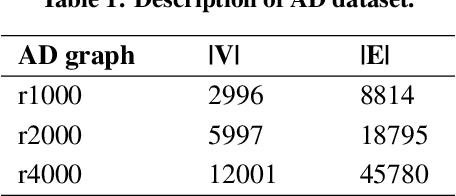Minjune Kim
TempoNet: Learning Realistic Communication and Timing Patterns for Network Traffic Simulation
Jan 22, 2026Abstract:Realistic network traffic simulation is critical for evaluating intrusion detection systems, stress-testing network protocols, and constructing high-fidelity environments for cybersecurity training. While attack traffic can often be layered into training environments using red-teaming or replay methods, generating authentic benign background traffic remains a core challenge -- particularly in simulating the complex temporal and communication dynamics of real-world networks. This paper introduces TempoNet, a novel generative model that combines multi-task learning with multi-mark temporal point processes to jointly model inter-arrival times and all packet- and flow-header fields. TempoNet captures fine-grained timing patterns and higher-order correlations such as host-pair behavior and seasonal trends, addressing key limitations of GAN-, LLM-, and Bayesian-based methods that fail to reproduce structured temporal variation. TempoNet produces temporally consistent, high-fidelity traces, validated on real-world datasets. Furthermore, we show that intrusion detection models trained on TempoNet-generated background traffic perform comparably to those trained on real data, validating its utility for real-world security applications.
Pensieve Grader: An AI-Powered, Ready-to-Use Platform for Effortless Handwritten STEM Grading
Jul 02, 2025Abstract:Grading handwritten, open-ended responses remains a major bottleneck in large university STEM courses. We introduce Pensieve (https://www.pensieve.co), an AI-assisted grading platform that leverages large language models (LLMs) to transcribe and evaluate student work, providing instructors with rubric-aligned scores, transcriptions, and confidence ratings. Unlike prior tools that focus narrowly on specific tasks like transcription or rubric generation, Pensieve supports the entire grading pipeline-from scanned student submissions to final feedback-within a human-in-the-loop interface. Pensieve has been deployed in real-world courses at over 20 institutions and has graded more than 300,000 student responses. We present system details and empirical results across four core STEM disciplines: Computer Science, Mathematics, Physics, and Chemistry. Our findings show that Pensieve reduces grading time by an average of 65%, while maintaining a 95.4% agreement rate with instructor-assigned grades for high-confidence predictions.
Unveiling the Black Box: A Multi-Layer Framework for Explaining Reinforcement Learning-Based Cyber Agents
May 16, 2025Abstract:Reinforcement Learning (RL) agents are increasingly used to simulate sophisticated cyberattacks, but their decision-making processes remain opaque, hindering trust, debugging, and defensive preparedness. In high-stakes cybersecurity contexts, explainability is essential for understanding how adversarial strategies are formed and evolve over time. In this paper, we propose a unified, multi-layer explainability framework for RL-based attacker agents that reveals both strategic (MDP-level) and tactical (policy-level) reasoning. At the MDP level, we model cyberattacks as a Partially Observable Markov Decision Processes (POMDPs) to expose exploration-exploitation dynamics and phase-aware behavioural shifts. At the policy level, we analyse the temporal evolution of Q-values and use Prioritised Experience Replay (PER) to surface critical learning transitions and evolving action preferences. Evaluated across CyberBattleSim environments of increasing complexity, our framework offers interpretable insights into agent behaviour at scale. Unlike previous explainable RL methods, which are often post-hoc, domain-specific, or limited in depth, our approach is both agent- and environment-agnostic, supporting use cases ranging from red-team simulation to RL policy debugging. By transforming black-box learning into actionable behavioural intelligence, our framework enables both defenders and developers to better anticipate, analyse, and respond to autonomous cyber threats.
CAMP in the Odyssey: Provably Robust Reinforcement Learning with Certified Radius Maximization
Jan 29, 2025



Abstract:Deep reinforcement learning (DRL) has gained widespread adoption in control and decision-making tasks due to its strong performance in dynamic environments. However, DRL agents are vulnerable to noisy observations and adversarial attacks, and concerns about the adversarial robustness of DRL systems have emerged. Recent efforts have focused on addressing these robustness issues by establishing rigorous theoretical guarantees for the returns achieved by DRL agents in adversarial settings. Among these approaches, policy smoothing has proven to be an effective and scalable method for certifying the robustness of DRL agents. Nevertheless, existing certifiably robust DRL relies on policies trained with simple Gaussian augmentations, resulting in a suboptimal trade-off between certified robustness and certified return. To address this issue, we introduce a novel paradigm dubbed \texttt{C}ertified-r\texttt{A}dius-\texttt{M}aximizing \texttt{P}olicy (\texttt{CAMP}) training. \texttt{CAMP} is designed to enhance DRL policies, achieving better utility without compromising provable robustness. By leveraging the insight that the global certified radius can be derived from local certified radii based on training-time statistics, \texttt{CAMP} formulates a surrogate loss related to the local certified radius and optimizes the policy guided by this surrogate loss. We also introduce \textit{policy imitation} as a novel technique to stabilize \texttt{CAMP} training. Experimental results demonstrate that \texttt{CAMP} significantly improves the robustness-return trade-off across various tasks. Based on the results, \texttt{CAMP} can achieve up to twice the certified expected return compared to that of baselines. Our code is available at https://github.com/NeuralSec/camp-robust-rl.
Optimizing Cyber Defense in Dynamic Active Directories through Reinforcement Learning
Jun 28, 2024



Abstract:This paper addresses a significant gap in Autonomous Cyber Operations (ACO) literature: the absence of effective edge-blocking ACO strategies in dynamic, real-world networks. It specifically targets the cybersecurity vulnerabilities of organizational Active Directory (AD) systems. Unlike the existing literature on edge-blocking defenses which considers AD systems as static entities, our study counters this by recognizing their dynamic nature and developing advanced edge-blocking defenses through a Stackelberg game model between attacker and defender. We devise a Reinforcement Learning (RL)-based attack strategy and an RL-assisted Evolutionary Diversity Optimization-based defense strategy, where the attacker and defender improve each other strategy via parallel gameplay. To address the computational challenges of training attacker-defender strategies on numerous dynamic AD graphs, we propose an RL Training Facilitator that prunes environments and neural networks to eliminate irrelevant elements, enabling efficient and scalable training for large graphs. We extensively train the attacker strategy, as a sophisticated attacker model is essential for a robust defense. Our empirical results successfully demonstrate that our proposed approach enhances defender's proficiency in hardening dynamic AD graphs while ensuring scalability for large-scale AD.
 Add to Chrome
Add to Chrome Add to Firefox
Add to Firefox Add to Edge
Add to Edge